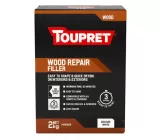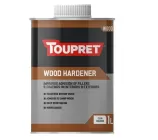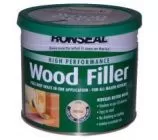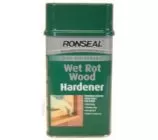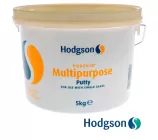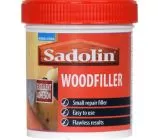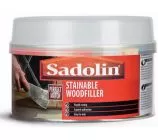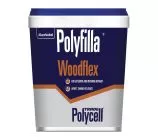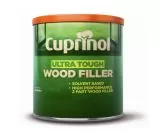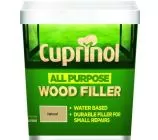
Wood Filler
-

Toupret Wood Repair Filler
From:£11.49(inc VAT)multiple sizes -

Toupret Wood Hardener
From:£25.49(inc VAT) -

Ronseal Hi-Performance Wood Filler (2 Pack)
From:£13.95(inc VAT)multiple sizes -

Ronseal Wet Rot Wood Hardner
From:£13.49(inc VAT)multiple sizes -

Mangers Linseed Oil Putty
From:£2.95(inc VAT)multiple sizes -

Sadolin Wood Filler
From:£5.95(inc VAT) -

Sadolin Stainable Wood Filler
From:£14.49(inc VAT) -

Polycell Woodflex Polyfilla
From:£4.95(inc VAT)multiple sizes -

Cuprinol Ultra Tough Wood Filler
From:£9.49(inc VAT)multiple sizes -

Cuprinol All Purpose Wood Filler
From:£5.95(inc VAT)multiple sizes
How long does wood filler take to dry?
Wood filler can take between 2-8 hours to dry, depending on the size of the damaged area. Shallow repairs can be sanded after 15 minutes whereas deep cavities will require 2-8 hours drying time before sanding.
What is wood filler made of?
Wood filler is made of a mixture of epoxy, lacquer, polyurethane, clay and sometimes even wood fibres. The most common type of wood filler is made of latex. For ease, some wood stains such as Cuprinol All Purpose Wood Filler are water-based so they can be cleaned up easily.
How do you use wood filler?
Wood filler can be used on small repairs around your house. It can be used to smooth out any scrapes, scratches or small holes. Start by removing any paint chips or splinters using a scraper and sanding down the area for a smoother process. Make sure to remove any sawdust and debris with a damp tack cloth then leave to dry thoroughly.
To apply the wood filler, squeeze the filler into the hole (if using a tube) or apply with a putty knife. If using a tube, make sure to fill the deepest area by pressing down into the crevice. For the smoothest finish, work from one end to another and overfill the hole as wood filler tends to shrink as it dries.
Smooth the wood filler with a putty knife when still wet. Bare in mind that it does not need to be the smoothest yet, as you can sand down the area once dried. The wood filler should dry in 8 hours. After this, you can sand down the area so it is smooth with the rest of the wood.
What is the difference between wood putty and wood filler?
The main difference between wood filler and wood putty is that wood putty does not harden. Wood filler does not harden, making it great for temporary repairs - though we offer 2-part putty systems that allow you to chemically harden the putty. Wood putty solely consists of a blend of plastics such as epoxy, fiberglass or polyurethane. However wood filler can be made of a mixture of sawdust, wood fibres and epoxy, lacquer, polyurethane or clay.
What is the best filler for exterior wood?
We recommend Cuprinol Tough Wood Filler, a 2-part system to ensure that any repairs are hardened to last against the weather. It is suitable for repairing damage caused by wet rot and can be screwed, sanded, filled or painted over. Due to its high-performance formula, Cuprinol Tough Wood Filler also resists shrinking, splitting and cracking, unlike other wood fillers.

